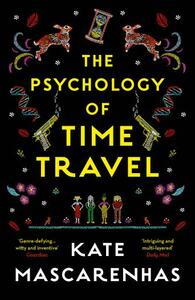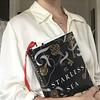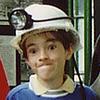Take a photo of a barcode or cover
adventurous
emotional
mysterious
reflective
sad
fast-paced
Plot or Character Driven:
A mix
Strong character development:
Yes
Loveable characters:
Yes
Diverse cast of characters:
Yes
Flaws of characters a main focus:
Yes
This book was SO GOOD I ranted into my phone for 7 minutes of voice notes.
It’s giving wibbly wobbly timey wimey goodness with literary fiction writing.
It’s giving wibbly wobbly timey wimey goodness with literary fiction writing.
Very similar in tone and mood to The Immortalists by Chole Benjamin.
It would have been extremely interesting to read more about what made Margaret into the woman she would become, including her background, which I felt was a bit sparse. Similarly, I would have liked to know more about Ruby. And Fay. In fact, I feel that a lot of the characters could benefit from more exploration.
Overall, this was an incredibly interesting story, and also rather unsettling — perfectly so, for the purpose of the narrative.
It would have been extremely interesting to read more about what made Margaret into the woman she would become, including her background, which I felt was a bit sparse. Similarly, I would have liked to know more about Ruby. And Fay. In fact, I feel that a lot of the characters could benefit from more exploration.
Overall, this was an incredibly interesting story, and also rather unsettling — perfectly so, for the purpose of the narrative.
mysterious
reflective
fast-paced
Plot or Character Driven:
Plot
Strong character development:
No
Loveable characters:
No
Diverse cast of characters:
Yes
Flaws of characters a main focus:
No
adventurous
mysterious
tense
fast-paced
Plot or Character Driven:
Plot
Strong character development:
No
Loveable characters:
Yes
Diverse cast of characters:
Yes
Flaws of characters a main focus:
Yes
adventurous
challenging
mysterious
medium-paced
Plot or Character Driven:
Character
Strong character development:
Yes
Loveable characters:
Yes
Diverse cast of characters:
Yes
Flaws of characters a main focus:
Yes
This is kind of "Bletchly Circle but make it Sci fi" which is a concept I am COMPLETELY on board with, but this book loses me in some of the finer points.
Good: a cast of women, who are smart and capable and well drawn. Grace's art. A vivid description of a manic episode. Overlapping narratives with multiple narrators. Odette, Ruby, Elizabeth, all great.
The bad: the romance (UGH so much for power differentials and age differences). Margaret. Grace. Toxic culture, deliberately created.
Good: a cast of women, who are smart and capable and well drawn. Grace's art. A vivid description of a manic episode. Overlapping narratives with multiple narrators. Odette, Ruby, Elizabeth, all great.
The bad: the romance (UGH so much for power differentials and age differences). Margaret. Grace. Toxic culture, deliberately created.
adventurous
mysterious
medium-paced
Plot or Character Driven:
A mix
Strong character development:
Yes
Loveable characters:
Yes
Diverse cast of characters:
Yes
Flaws of characters a main focus:
Complicated
This! Yes! This is a time travel novel of sheer perfection.
A time-travel mystery melding with a wide-reaching character study. I'm flabbergasted. The Psychology of Time Travel was a gordian knot balanced faultlessly with an endless loop, wherein everything ties back into itself. Mascarenhas has written a wonderfully nuanced and brilliantly executed book that I could easily see myself revisiting again and again.
To try and summarize this book properly would require a dinner, a bottle of red wine, some great food, and everyone's undivided attention. I mean...give me the proper amount of elbow room. But, suffice it to say, that cannot be delivered here. Instead, just know that there is a complete cast of characters that is somehow so full but never overwhelming.
Mascarenhas begins with a proper opener by introducing the reader to the four female pioneers of time travel: Barbara Heresford, Margaret Norton, Grace Taylor, and Lucille Waters. Just as they are achieving the success for which they've worked so hard, Barbara has a breakdown in front of the press. Faced with the risk of upsetting the entire future of time travel, the other three pioneers oust Barbara from the project—permanently severing all ties to her.
What follows is truly an audaciously intricate passage through time—just not a direct path. Mascarenhas bounces around on several forward moving timelines. Along with a smattering from other times, the three major ones take us through events from the late 1960s through the early half of the 1970s with the pioneers; then with Ruby Rebello in 2017; and with Odette Sophola in 2018.
The older of the trio of main timelines guides the reader through the inception of time travel, the opening of its governing body, the Conclave—run by Margaret Norton, and its early beginning years. We get to know each early traveler and pioneer in stops and starts—including Barbara. The later timelines, nearer our own, reveal themselves as mysteries of sorts for Ruby and Odette to explore separately—and simultaneously considering the time traveling aspect. Ruby's involves mysterious information and uncovering and deciphering the proper clues, while Odette's actually involves the case of an unknown victim of a homicide. Odette discovers the body of an elderly woman and is unable to rest without combing through the facts and discovering the truth for herself. All ending with such a delightfully insane trial that I read it through twice.
The plot unfolds in a fantastically subtle and organic way, despite its nonlinear construction, even down to the characters’ last names, their timelines, and their role in the story itself. Boasting fluid storytelling and unchangeable plot points, this book is as captivating as it is complex. The utter uniqueness of The Psychology of Time Travel made me want to start the book over immediately.
I received this book for free from the publisher via NetGalley in exchange for an honest review. This affected neither my opinion of the book, nor the content of my review.
A time-travel mystery melding with a wide-reaching character study. I'm flabbergasted. The Psychology of Time Travel was a gordian knot balanced faultlessly with an endless loop, wherein everything ties back into itself. Mascarenhas has written a wonderfully nuanced and brilliantly executed book that I could easily see myself revisiting again and again.
To try and summarize this book properly would require a dinner, a bottle of red wine, some great food, and everyone's undivided attention. I mean...give me the proper amount of elbow room. But, suffice it to say, that cannot be delivered here. Instead, just know that there is a complete cast of characters that is somehow so full but never overwhelming.
Mascarenhas begins with a proper opener by introducing the reader to the four female pioneers of time travel: Barbara Heresford, Margaret Norton, Grace Taylor, and Lucille Waters. Just as they are achieving the success for which they've worked so hard, Barbara has a breakdown in front of the press. Faced with the risk of upsetting the entire future of time travel, the other three pioneers oust Barbara from the project—permanently severing all ties to her.
What follows is truly an audaciously intricate passage through time—just not a direct path. Mascarenhas bounces around on several forward moving timelines. Along with a smattering from other times, the three major ones take us through events from the late 1960s through the early half of the 1970s with the pioneers; then with Ruby Rebello in 2017; and with Odette Sophola in 2018.
The older of the trio of main timelines guides the reader through the inception of time travel, the opening of its governing body, the Conclave—run by Margaret Norton, and its early beginning years. We get to know each early traveler and pioneer in stops and starts—including Barbara. The later timelines, nearer our own, reveal themselves as mysteries of sorts for Ruby and Odette to explore separately—and simultaneously considering the time traveling aspect. Ruby's involves mysterious information and uncovering and deciphering the proper clues, while Odette's actually involves the case of an unknown victim of a homicide. Odette discovers the body of an elderly woman and is unable to rest without combing through the facts and discovering the truth for herself. All ending with such a delightfully insane trial that I read it through twice.
The plot unfolds in a fantastically subtle and organic way, despite its nonlinear construction, even down to the characters’ last names, their timelines, and their role in the story itself. Boasting fluid storytelling and unchangeable plot points, this book is as captivating as it is complex. The utter uniqueness of The Psychology of Time Travel made me want to start the book over immediately.
I received this book for free from the publisher via NetGalley in exchange for an honest review. This affected neither my opinion of the book, nor the content of my review.
3.5 rounded up to 4. It's not my kind of book but it was well written. It really was about the psychology of time travel and how time travelers and those in their lives are affected by it both emotionally and psychologically.
Enjoyed this. It carves a fairly novel and interesting path for how time travel came about, how it works and how it is managed once it exists. It follows various female characters and the fallout in their lives from stemming from time travel's invention, some through their own involvement, and some caught up in it all by accident.







